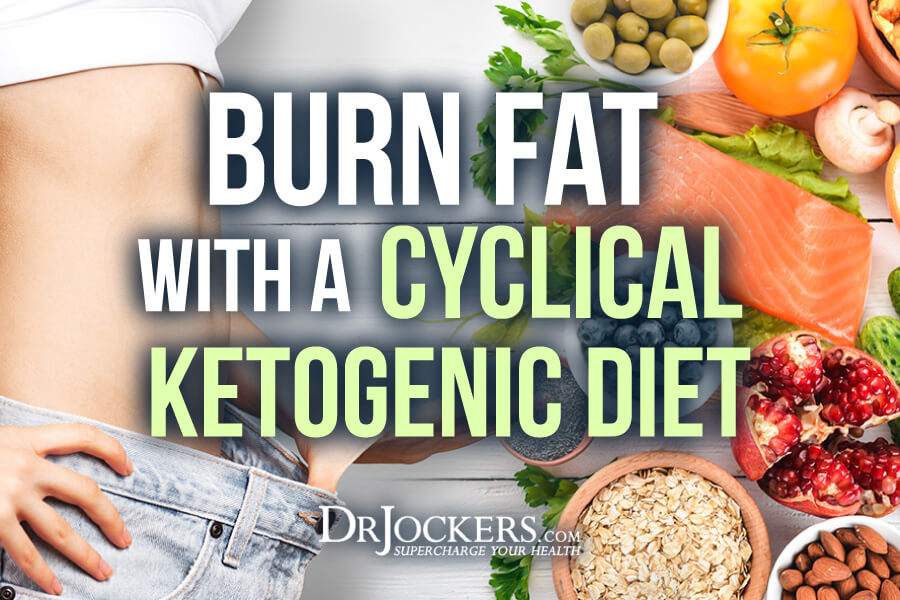
The Cyclical Ketogenic Diet
What is a cyclical ketogenic diet and how does it help one burn fat? By the way, what even constitutes an optimal physique? This is different based on each individual’s unique genetic potential but researchers would agree that we should have a moderate to thin structure and good muscular development.
While many have sought after a thin physique, the mantra of the 21st century is that strong is the new thin! We want to have a good body fat percentage (6-15% for men and 15-30% for women) and have developed well-toned musculature. This article discusses how to build muscle and burn fat with a cyclical ketogenic diet
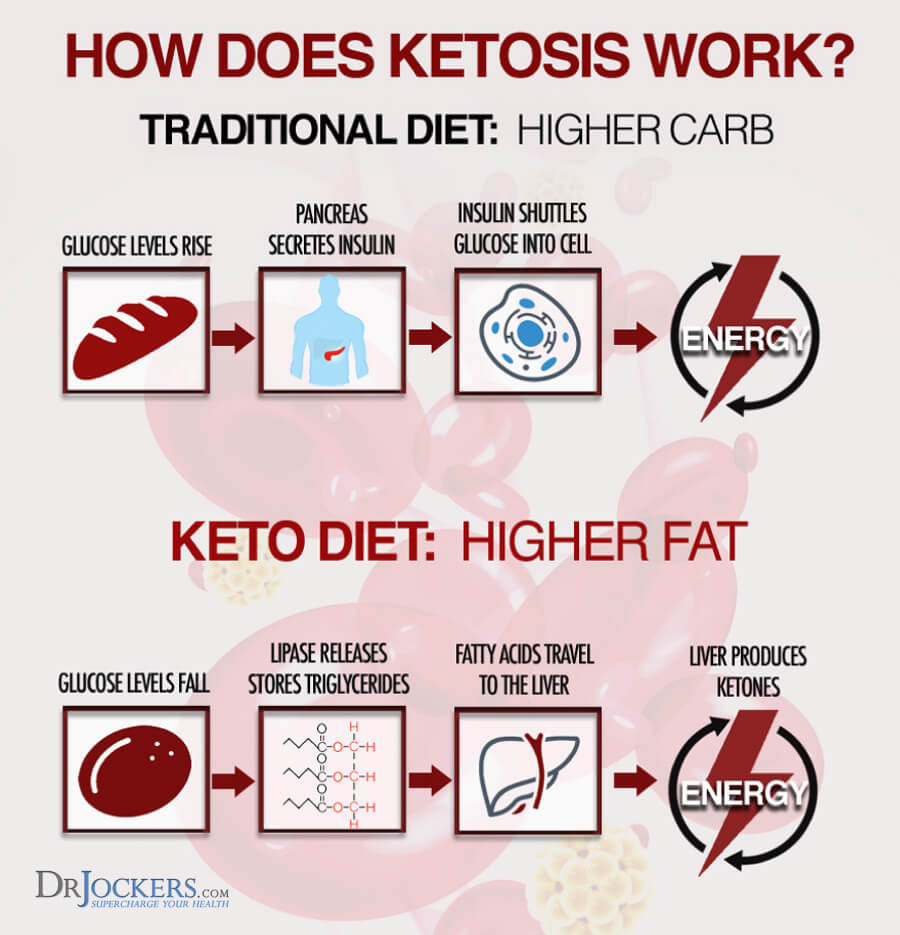
Ketogenic Diet and Fat Metabolism:
A ketogenic diet is a very low carbohydrate, moderate protein, and high fat based nutrition plan. A ketogenic diet trains the body’s metabolism to run off of fatty acids or ketone bodies. This nutrition plan has been shown to improve insulin sensitivity and reduce inflammation. This leads to improved muscle development and fat metabolism (1, 2).
The ketogenic diet is built around good fats such as grass-fed butter, coconut products, avocados, nuts/seeds, pasture-raised animal products, and extra-virgin olive oil. This diet should also focus on low-carbohydrate fruits, vegetables, and herbs as staple components. The fat levels will be between 60-80% of calorie intake.
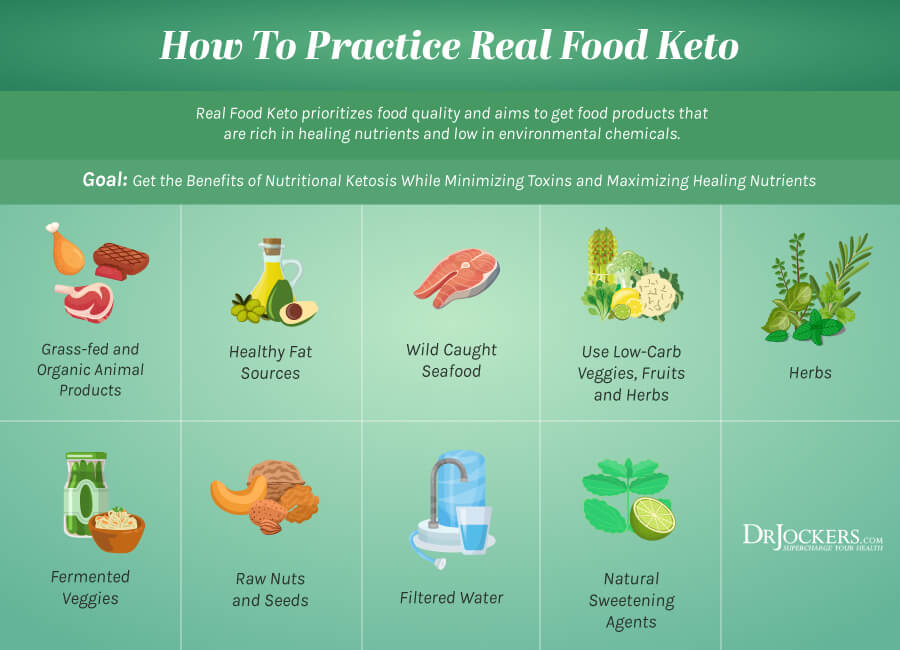
How Ketones Are Formed?
The body has two major energy sources, it burns glucose or ketone bodies. The majority of people burn glucose primarily because they are constantly supplying a steady form of sugar, starches, and proteins that can be turned into blood sugar. When one either fasts or goes on a low-carb, moderate protein, and high fat diet they switch their energy source to fat.
In particular, the fatty acids are broken down into ketone bodies. The three major forms ketones produced in the body include Acetoacetate, Acetone, and Beta-HydroxyButyric acid. These are released into the blood from the liver when insulin levels are low and hepatic liver metabolism is increased (3).

Healthy Cell Membrane:
The cell membrane is the double outer layer of fatty acids. This structure is made up of a blend of saturated, monounsaturated, and highly unsaturated fatty acids (HUFAs). The cell membrane and particularly the HUFAs are very susceptible to free radical damage. This free radical damage causes something called “lipid peroxidation” and negatively affects hormone sensitivity (4).
Elevated lipid peroxidation leads to issues like insulin resistance and poor blood sugar metabolism (5). Insulin resistance and poor blood sugar metabolism lead to fat storage and muscle tissue breakdown. This is the antagonist to healthy aging and a desirable physique.
The Two biggest dietary factors that reduce lipid peroxidation include
1) The Anti-oxidant Content of the Diet
2) Carbohydrate Level of the Diet
Research has shown that a low-carbohydrate, ketogenic diet reduces oxidative stress in the body (6). The reduction in oxidative stress on the cell membrane allows for the formation of healthy insulin receptors and normalized blood sugar regulation.
This improves insulin sensitivity which further reduces inflammation and fat storage in the body. (7) The more sensitive the body is to insulin, the less stress it puts on the rest of the system and the easier it is to build muscle and burn fat.
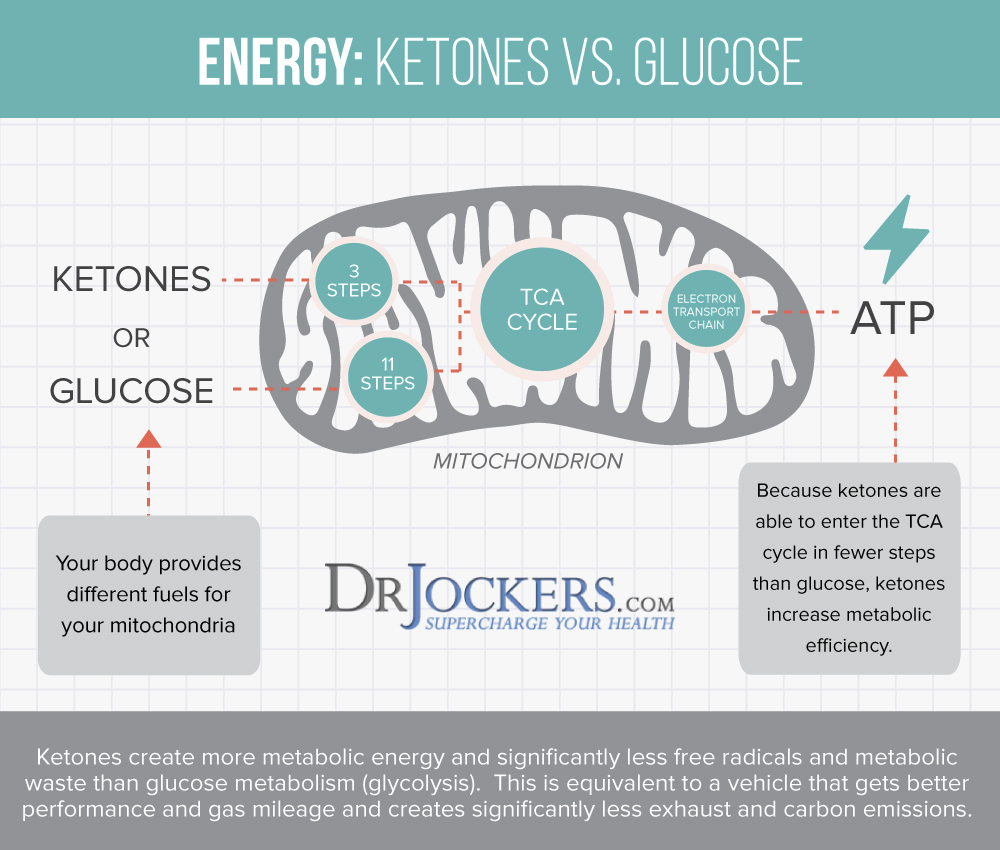
Protein Sparing & Healthy Muscle Tissue:
A healthy body is not thin and weak. A desirable physique is strong and has well-developed muscle tissue that is genetically congruent for the individual. The antagonist to this is again poor blood sugar sensitivity and insulin resistance.
High carbohydrate diets increase the level of muscle cell inflammation and reduce protein synthesis (8). For many body types, this leads to a catabolic or cannibalistic state where the body eats up the muscle tissue. This leaves the individual with a very thin and underdeveloped physique.
A properly formed cyclical ketogenic diet maintains circulating branched chain amino acids (BCAAs). These BCAA’s (leucine, isoleucine, and valine), especially leucine are critical for protein and muscle synthesis in the body. Blood leucine levels, a powerful regulator of muscle protein synthesis, increase on a ketogenic diet. Meanwhile, insulin levels decrease on a ketogenic diet as does muscle inflammation (9)
The result of this is that the muscle cells will have an environment that promotes proper development and optimal function. The keto-adapted state improves the efficiency of protein utilization. The greater economy of protein allows for less to be consumed while still maintaining healthy blood leucine levels for proper muscle development and recovery (10).
Practical Considerations:
There is a popular idea that the body needs carbohydrates and protein immediately after exercising in order to properly recover. However, with the application of a properly formulated cyclical ketogenic diet to achieve a keto-adapted state, this is not necessary. Keto-adapted individuals can often fast for periods after a short high intensity workout and see improvements in strength and muscle development.
In my late teens and early twenties, I would eat around 5,000 calories a day with over 200 grams of protein. I used to have to eat before and after I exercised. My diet was probably 50% carbohydrate, 25% protein and 25% fat. This nutrition plan resulted in good strength gains but also destroyed my gut, and desensitized my cells to insulin leading to blood sugar instability and chronic inflammation. The elevated carbohydrate and protein levels also promoted the development of cancerous growths in my body.
This resulted in severe health problems and 5+ years of learning better strategies to improve my health. A few of the strategies I noticed incredible improvement with included the ketogenic diet and intermittent fasting. I also learned to focus on superhydration with anti-oxidants in the morning hours. I typically drink 64oz of water before 12 PM and use antioxidant extracts such as lemon and/or antioxidant supplements in the morning hours.
Now, I eat 2 meals a day between a 4-8 hour eating window and consume around 3500-4000 calories with approximately 60-70% fat, 20-25% protein, and 10-15% carbohydrates on average. Some days, it is 70%, 25%, 5% while other days it is 60%, 20%, 20%. I work out intensely in the morning and NEVER eat afterward. I follow a cyclical ketogenic diet and eat my meals between 1 PM and 8 PM on most days.
The results – I am stronger in my upper and lower body and feel significantly better than I did in my teens and 20’s.
What This Means to You:
As a clinician, I believe that everyone on the planet will benefit from a well-formulated cyclical ketogenic diet. This will look different for each individual. Some will do great with 80% fat, 15% protein, 5% carb. Some will need more carbohydrate and protein, or maybe just one or the other, etc.
I am not strict about counting calories or percentages of macronutrients and the numbers I provided were approximations based on the foods I typically consume. I would encourage you not to be dogmatic with macronutrient counting but instead, be strongly considerate of the quality of fuel you are putting into your body and you should categorize it as primarily fat, primarily protein, protein/fat, protein/carb, or primarily carbohydrate.
There are many key variables that play a role in the proper formula for success. These include your unique genetics, your exercise, activity, and stress levels, your sleeping habits, levels of inflammation, and the health of your thyroid, adrenals, and liver/gallbladder.
By cyclical ketogenic diet, I am referring to a state of cycling in and out of ketosis. I will typically have a larger carbohydrate meal (using healthy starches like sweet potato, quinoa, brown rice, or a good sweetener like fruit, raw honey, or coconut nectar) once or twice a week. This pulls me out of ketosis for a short period and then I enter right back in the following day while I am doing my morning fast.
Some individuals do well with the inclusion of a higher carbohydrate meal two or 3 times a week while others will do better staying in ketosis for a month at a time. You will have to experiment to find what you feel best with.
Would love to hear about your experiences with a cyclical ketogenic diet in the comments box below.
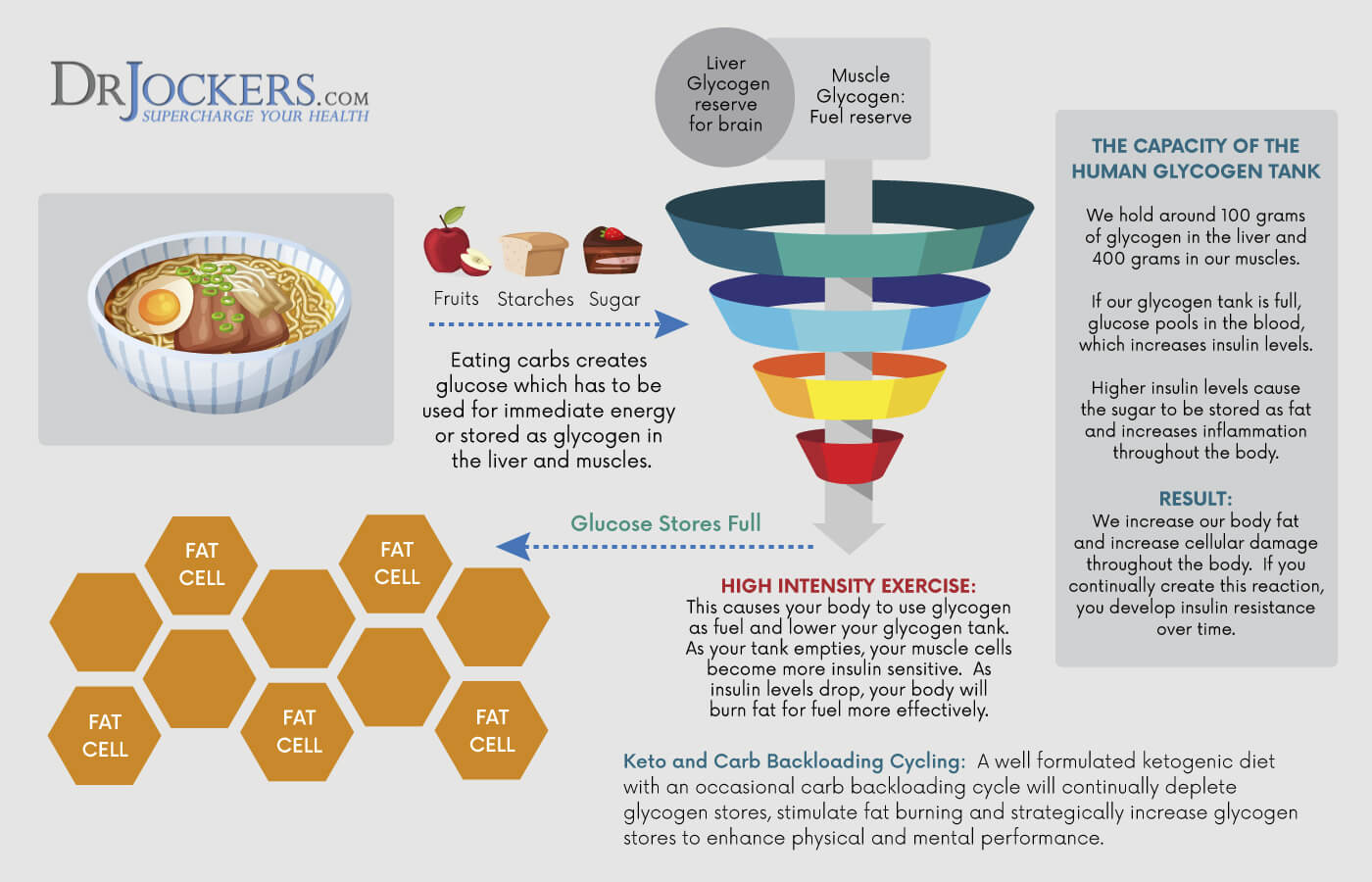
If you want to work with a functional health coach, I recommend this article with tips on how to find a great coach. On our website, we offer long-distance functional health coaching programs. For further support with your health goals, just reach out—our fantastic coaches are here to support your journey.
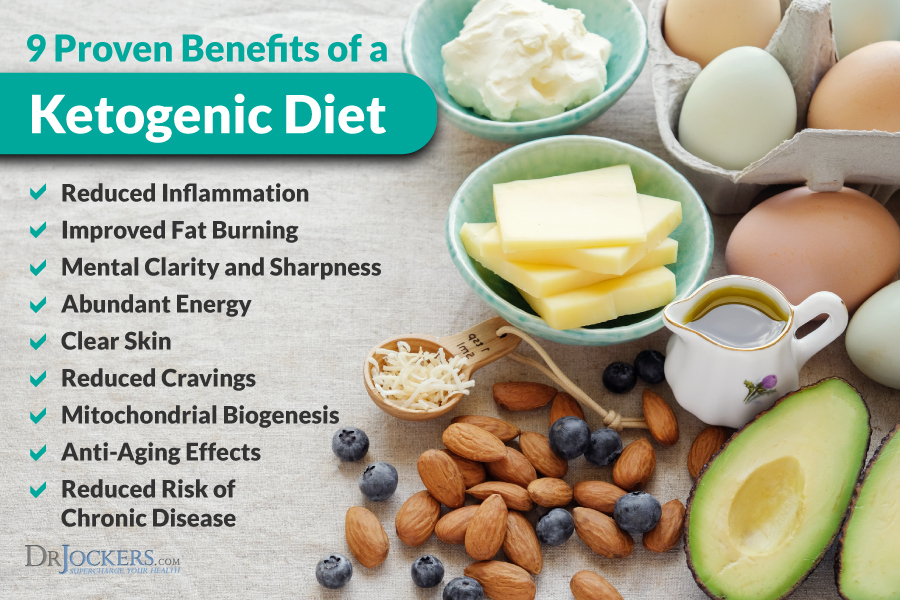




Can you provide a sample of what your daily meals consist of? It would be helpful to see how to conceptualize how to structure meals to achieve a macronutrient ratio that allows ketosis
Yes, I attached it as a link in the article above. Here it is again: https://drjockers.com/2014/02/meal-planning-ketogenic-diet/
Hi Doc, this is a great article. My natural inclination has always been to eat fat, some of my fat sources however have not been good. I started your Super Energy/Alkaline regime again just 7 days ago. I know I have lost at least an inch around my waist (not sure about weight as I do not have scales at home). My greatest demise and challenge has been my consumption of alcohol which became a habit many years ago. In my 40’s I was a reasonable size but when I got to my fifties the weight piled on. Now that I am in my 60’s (65), I have reached a crisis point regarding my weight and I have now got to the point where I want to REALLY do something about it. I take it a day at a time and try not to thing of the new way of living as days and weeks ahead – I just focus on getting through each day. My struggles have been around withdrawals and de-toxing but I am getting there step by step. Thanks for your great web-site and encouraging information and articles.
By the way there at least a couple of typos’ in the above article but I wonder if this one was intended “My diet was probably 50% carbohydrate, 25% protein and 25% carbohydrate”? Did you mean the last 25% to be ‘Fat’?
Sometimes just creating these documents in Word and then proofing them (or get someone else to) is a great help in reducing typo’s and grammar issues?
Very best to you – may be in your office later today to pick up some product!
Brian
Dr jockers, thanks for this article. I’ve been doing the ketogenic diet for 2 months now and am having a really hard time getting deep into ketosis. I have a low thyroid/adrenals due to many years of very low calorie dieting. I have actually gained weight on keto . I’m guessing its bc my metabolism is messed up. I’m still only eating 1300-1500 calories a day. I have kept fats at 80 % , protein 15%, and carbs 5 %. I am 40 yrs old . My question is do you think cyclic ketogenic diet is better for the thyroid and adrenals than a strict keto diet without breaking ketosis?
Yes, I would definitely recommend doing a cyclic keto to kick start your thyroid
By cyclic keto are you referring to evening, post workout or once a week carb ups?
Yes, once or twice in the evening – eating more carbs.
At LA Fitness in Belleve they have this really elaborate sports and fitness collage with the words “extreme fitness” and “sex” intertwined together. I think the two words go together well. Another motivator for the ketogenic diet.
I love the keto diet, but it has made me lose too much weight. I was slim to start with now and now I’m getting skeletal. Is it possible to gain weight on a keto diet? Or do I need to carb cycle? I’m doing this diet mainly for the mental benefits.
PC – you will need to do some resistance training with fairly heavy weights so you can boost your HGH and testosterone and this will help you gain lean body mass.
I am 53, had my thyroids removed due to cancer. I have been doing keto for a year lost 25 lbs, I am still in ketosis,(according to keto sticks) however I have stopped losing. I eat breakfast and dinner only. I am not hungry and it is safer for me to eat at home.
What can I do to keep losing.
I have been on the keto diet for a month. I love it and the way my body feels. But I think my troubles are with fat loss. Im not seeing as much as I hoped. Ive been keeping a log and on average im doing 80% fats, 15% protein and 5% carbs. I do burst training and breathing exercises about 6 days a week. I willing to make adjustments just not sure where. What can you advise?
I’m type 1 diabetic. I stick to a high protein/fat diet w very lil carbs already. My blood sugars are crazy no mater what I try doing. Does this diet still work when taking insulin like I do? I use on an average day 30 units of humalog insulin even when eating 75 g of carbs a day. I guess I’m wondering if I’m taking that much insulin wout eating much carbs will my body still use keystones so that I’m losing fat? I’m not at all a big person but I’ve always wanted to get the lil fat I have off me or reduce it some. I’ve come to the conclusion that me being type 1 it might never happen and I need to learn to accept my body as is, but is that true? Can I type 1 diabetic lower body fat easier a certain way ? This diet seems like it might be the way
As a type I, you can use the ketogenic diet to reduce the amount of insulin you will need but I would not expect to come off of it completely. However, the diet will still help your body heal and reduce inflammation and 50-75 g/ carbs is prob the right way to go for you.
You can always test to see if you are producing ketones with a simple urine ketone strip test.
Hi Dr. Jockers. I just listened to your presentation on the Reversing Diabetes Summit and am now motivated to start your cyclic ketosis method. I’m a bit confused about carbs. When you say to keep carbs in the 65-80g/day range does that mean total carbs? I eat a lot of fiber (30-50g/day) mostly from foods like chia, hemp, and flax that don’t effect my blood glucose (I’m an insulin dependent diabetic). Do I need to count the fiber that doesn’t raise my BG in the 65-80g/day? Also, on the carb load meal once a week; how many carbs would be a good range to shoot for?
Hey John, no fiber does not count in that carb count. Only net carbs that have an effect on your metabolism. You can also use a blood sugar monitor to see how you respond to differing amounts of carbs and different food types.
Thank you Doc. When I do my 1x week carb back load, how many carbs is a good start. A bunch of folks over on Fat Secret are doing back loading and it seems a very misunderstood technique. I know I’m confused on this.
Hey John, you only need about 50 carbs or so for back loading, unless you are doing a lot of exercise. For regular burst training, 50 net carbs is great.
Is it possible to do a ketone diet if one is a vegan.
Yes it is John, just more challenging. I believe Patricia Daly has a lot of good suggestions here: file:///C:/Users/David/Downloads/eBook_Keto-L.pdf
Hi Dr Jockers,
I have experimented with a ketogenic diet and even though I was eating only 10-15 grams of net carbs a day I couldn’t elevate my ketones. I did keep a diary and my fat intake was around 80%. It took about 3 weeks to get to a reading of 0.5 and then I struggled to keep the reading elevated.
The maximum blood ketone reading I got was 1 and it usually stayed around 0.4 and sometimes was around 0.8 after walking.
I have CFS (chronic fatigue syndrome) and can’t do much exercise so I am restricted to only walking or swimming. Is it possible that my body is breaking down muscle tissue to produce glucose?
I did feel like my energy levels were better but I have now incorporated sweet potato and some brown rice and I was frustrated with not being able to elevate my ketone levels.
Laura,
Most likely you were in adrenal fatigue and struggled with cortisol dysregulation. I would have recommended supporting your adrenals with pre-methylated B vits and adaptogenic herbs like ashwagandha. Using carnitine can really help with fat metabolism in the mitochondria as well.
Thank you for your response. I am using carnitine but have only recently introduced B vitamins. Thanks again.
Are there any essitials oils you would suggest using for the adrinal fatigue?
I am not an expert on any of this, but I have tracked my macros enough to know that my daily diet is predominately LCHF. I’ve been following this plan for almost 6 months, and it suits me for the most part. However, I have two concerns: 1) I started this to try to lose a bit of weight. I’ve lost about 10 pounds — several pounds right away, and a few more when I gave up dairy products, but there has no weight loss since then. I figure that, even though I’m eating good foods, I must be consuming too many calories. Yes? 2) I have had a few days in the past 6 months where I could honestly say I “fell off the wagon. Maybe 2 or 3 times. After one of these days, I experience edema in my ankles, primarily my L ankle, and it takes a few days to get rid of it. This symptom is one the reasons I went with KETO in the first place, and although it is much better in general, it returns with a vengeance if I am not strict about my eating. Will this always be this way? It was suggested to me that the edema might be being caused by dairy (damaged villi?), that’s why I quit it, but I was hoping I would be able to go back to eating dairy at some point. My point is, I feel that I have greatly improved the quality of my diet, but I’m not completely seeing the results (though blood test may tell more) that encourage me to continue. It’s not that I dislike the food, but the restrictiveness with family/social life can be tiring.
Hi. Dr. Jockers,
Great article as always.My name is Sashko Drvoshanski and I’m from Republic of Macedonia (South East Europe).I regularly follow your posts and your appearance on on line seminars and public interviews and I have learned a great deal from you.I believe that I have good, balanced LCHF diet. It certainly is very low of carb, yet it could be higher in fat. I also drink fermented dairy (kefir) on a daily basis and I incorporate a cheat day once a week to prevent leptin resistance. I exercise about 3-4 times per week up to 45 min, mainly body weight training combined with burst training.Overall I feel great, lean, good energy levels… however I still struggle to keep my cholesterol level in balance. My triglycerides level is and has always been good, and my HDL is good, but my LDL is constantly high. I know about the importance of cholesterol and have even read materials that claim one should completely ignore high cholesterol when everything else is normal and a healthy lifestyle is practiced, but I kindly ask for your recommendation and tips on how to normalize the cholesterol level! Thank you, Sashko
Hey Sashko,
No need to worry about LDL numbers as long as your HDL is high and trigylcerides are low. However, adding in more anti-oxidant protection such as high quality fish oil, curcumin and optimizing vitamin D3 levels is highly recommended.
Thanks for the prompt reply. I just want to ask as we rarely include fish in our daily menu (partly due to tradition, partly due to lack of available produce) how much Omega 3 (fish oil) should I supplement with. Currently I take 2-3 pills per day, 1 pill containing 180 mg EPA and 120 mg DHA. Should I increase the dose? And how much vitamin D do you recommend daily? Thanks so much in advance, Sashko
Is there any chance you can post suggestions for those with Thyroid/Adrenal problems and doing a low carb/ketogenic diet? I have Hashimotos and Adrenal fatigue, so I always crash when doing a Keto diet. Is there any work around or suggestions on plan that would work as well as Keto in obtaining optimal health? Even cyclical Keto programs do not seem to be enough at this point. Thank you for any support and information you could provide.
Marilyn Udeen
Hi Dr. I have started the Keto diet about a month ago… I notice my heart rate is higher, and feels like my blood pressure has increased. It is not at an alarming rate or pressure, but has increased since starting the diet.
It was 55 bpm and 120/80…. But now it’s 70bpm and 130/90
I read that it may be my body converting to the efficiency of ketosis… Any comments would be helpful.
Lost 20lbs
Hey Bob, great job on the weight loss. This is not uncommon. Your body may not be able to tolerate real low carb well and may be producing more uric acid.
I would recommend doing a cyclic ketogenic diet where you add in some healthy carbs in the form of sweet potato, pumpkin, or some extra berries in a shake or an apple in a green juice. Add these things in every other day. So low-carb for 1 day and then a moderate carb day and then low carb again the next day and so on.
Hi Dr. Jockers. I have just started the IF/ketogenic diet and had already started a resistance training program to jumpstart my body to get ready for physique training. I would love to know how many carbs, fats, etc I need to take in for my exercise regimen. What carbs, proteins, and fats I need to intake? My schedule is a 10:00 shake, 2:00 salad, 6:00 meat and veggies, and fast until 10 the next morning.
Hey Marquesha,
This sounds like a great program. You want to aim for less than 15 grams of carbs for each meal if possible, about 15-20 grams of protein and about 30-40 grams of fats. If you are training really intensely you can add 5-10 more grams of each.
Dr Jockers, do you have any tips for someone just starting out on a ketogenic diet with CFS. I’m much improved after 7 years, but not completely over it yet. I think keto will really help. Also how long does it typically take to go into ketosis?
Thanks, Mark
Hey Mark, yes this article has key information to help you understand that. Usually takes 2 weeks to get into ketosis: https://drjockers.com/programming-ketogenic-diet/
Hello. I have a couple questions… in the podcast above you mention a systemic enzyme for anti inflammatory, but I would.like name of enzyme supplement. (Could not understand name in podcast). Also, you mentioned a supplement containing green coffee bean extract, rodeola, oswaganda, probiotic,…..would appreciate the name of this supplement as well. Please and thank you. Heidi
Hey Heidi,
Thanks for writing. I discussed the Wobenzyme supplement here:
https://store.drjockers.com/products/wobenzym
Hello.
I am wanting to start the Ketosis diet but I have two problems – obstacles – that are slowing the start of this diet down.
I am Canadian, living and working in Bolivia, and many of the ingredients that are in the menus that I read I can not get in Bolivia.
The other problem is that I am dyslexic and have a very hard time figuring out amounts and what I should eat based on the foods that I can get here.
I need some help setting up a meal plan with the available foods and figuring out the quantities of said foods to have a 1500 calorie diet.
Can you help me?
Hope so,
Gratefully,
Joanne
Hi Dr. Jockers!
Your articles are awesome; thanks so much for putting them up, and I look forward to learning more from you over the years to come. Quick question: When you speak of including, say, 20grams of protein in a meal (as an example), is that 20grams of actual MEAT or are you talking strictly about the grams of protein IN that meat. For example, not all of a steak is protein; a 100 grams of steak can have 24 grams of protein; so in this example, do we go by the weight of the steak in this, or the weight of the protein within the steak?.
Thank so much!
Armaan
Thank you Armaan! Yes, 20 grams of actual protein (not just 20 grams of meat). It would be about 100 grams of steak.
Hello Doctor,
I am thinking about experimenting with this.
I’ve been on keto for close to three months, and I’ve been stalled out for a few weeks, now.
Do you think there is any danger to me having a nice, healthy carb dinner, one night in the coming week?
Just curious if i should be concerned, because of how long I’ve been on strict keto.
Also, how much fat should people eat on their carb days?
I mean, obviously less than a regular keto day. But do you have a recommended ratio?
Thanks in advance.
George
Hey George, great question.
You should be okay to reintroduce carbs. Nothing overly sugary like fruit but maybe start with some sweet potato with lots of healthy fats to keep blood sugar stable. As for ratios you still want to get most of your calories from healthy fats, even on days you cycle out. Your strategy will work, try having carbs with one meal on your cycling days. You should notice you feel better when you introduce cycling into your ketogenic diet.
Blessings!
Hi Dr.Jockers
I would like to ask if it takes to get keto adapted 2 to 4 or more weeks.How does it work when you do 5 days high fat and then 2 days reload carbs.If you kick out of ketosis during carb refeeding days, how you then get back into the state of burning ketones sufficiently (keto adapted state). I understand seasonal cyclic idea where you do 2 or 3 or more months keto lifestyle then switch to a bit higher carb and so on. More like primal where you eat depends on an available food source.
Would appreciate if you have time to answer or share a link to an article etc.
Thanks
Hey Moe, you can follow the weekly cycle approach and your body will still become keto adapted over a few weeks! Once you are fully adapted you will be able to switch between ketosis and glycolysis relatively quickly. If you want to speed up the time it takes to get into ketosis you can perform a fast, consume MCT oil with meals, or supplement with an exogenous ketone!
Hi does alcohol take you out of ketosis? Is it possible to drink any alcohol on this plan?
I generally do not recommend alcohol consumption but you would be okay to have 1-2 glasses of a dry red wine or Liquor such as vodka, Gin, or Tequila.
Cheers!
Hi Dr. Jockers,
I take immunosuppressants for a kidney transplant 12 hours apart, 2 times a day. I can’t find any information about whether being in ketosis would affect either my transplant (if my immune system improves) or the levels of medications in my blood. There are probably no studies done yet on transplant patients and ketosis. What do you yhink, and are you aware of any resources you could point me to? I’ve looked everywhere on the web and have had a hard time finding any research on this. Thanks for all the non-hype information on your website!
Thank you for reading Shari!
I have not come across any specific studies on this effect. For most people it has a balancing effect meaning it should support optimal immune system function.
Hi,
isn’t regular switching from one to other fuel (glucose to fat, fat to glucose) stressful for body? I would like to see an article on body, metabolism, stress factors when it’s switching from high fat to high carb diet regurarly. I am on lchf almost a year now and results are great. However, there are situations when I would like to eat some cake, but am afraid it would be too much shock for my body to regularly do that, that is to regurarly go in and out of ketosis like that.
Thank you!
Hey Lidy, good question! It is actually very helpful for most people to consume one higher carb meal once every 1-2 weeks. I don’t recommend doing this with cake as you suggested but rather with low glycemic carbs such as sweet potatoes, organic berries, or white rice cooked in coconut oil.
Hi doc,
I am currently on a ketogenic eating habit. Generally almost for a year now. I am a heavy lifter and my runs are high intensity in nature, my aim is to lower body fat and gain some muscle.
I am very afraid of “sugar” and carbs however I am open to the concept of carb cycling if it increases my energy level.
I am also doing a 16/8 Intermittent fasting plan and I usually workout fasted. How much and what type of carbs should I consider and when do I take it?
Hey Purinsu, I would recommend starting with one high carb meal once a week (such as Saturday). I would go for low glycemic carbs like sweet potato, white rice cooked with coconut oil added to the water, or organic berries. This should be great for you!
Hi!
Keto strict for 8 month…hypo thyroid fonction. It is better for my thyroid if a add a carb dinner once a week ? (Saturday night ). Then i Will have to surfer from keto flu the next couple of day ?
Thank you
What would you recommend for daily caloric intake and macro ratio breakdown that you’d recommend for a 46 year old male, 185lbs., very active? Is 2,500 calories, 65% fat, 30% protein, 5% carbs good? At these numbers the protein comes in quite a bit higher than the recommendations I see online regarding MTOR, so I am getting confused on the best approach to both ensure that I’m meeting my macros, getting enough protein, and limiting MTOR. Would confining my eating window to 8-10 hours/day help mitigate the higher protein level?
Hey Chris, yes this sounds right. I would absolutely practice intermittent fasting and restrict your eating window to around 6 hours each day to suppress MTOR.